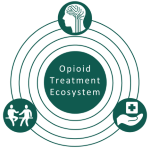Michigan's Social Work Opioid Experts
In the United States there have been more than a half-million deaths in the past decade, with opioids associated with over two-thirds of these deaths, and the age-adjusted overdose death rate in Michigan is almost twice the national average. The Wayne State University School of Social Work has dedicated faculty, staff and resources to address this epidemic. In partnership with foundations, state and federal funding agencies, these education, training, evaluation and research projects tap into the expertise of our Warrior faculty and staff. These endevours reinforce our commitment to working with community partners and agencies to empower social change in Detroit and beyond.
Building Capacity to Integrate Trauma Informed Substance Abuse Assessment and Intervention into Primary Care
Funding Agency: Federal Human Resources and Services Administration (HRSA)

Wayne State School of Social Work Associate Professor Suzanne Brown, PhD serves as a co-Principal Investigator on this project with co-PI Umeika Stephens, DNP, PMHNP-BC, FNP-BC, Assistant Professor, Clinical and Graduate Specialty Coordinator for the Psychiatric-Mental Health Nurse Practitioner in the WSU College of Nursing. Wanye State School of Social Work Assistant Professor, Clinical and Assistant Dean for Student Affairs Anwar Najor-Durack, PhD also collaborates on this project.
This partnership between the Wayne State School of Social Work and College of Nursing seek to build behavioral health integrated care competence in Detroit's medically underserved community. The purpose of this project is to develop and enhance the behavioral health workforce in the greater Detroit community, and to advance nursing education, social work education, and clinical practice. Each health professionals, Nursing and Social Work faculty, Nursing preceptors, Social Work supervisors and faculty field advisors, and students are trained in evidence-based interventions such as Trauma-Informed Care, Motivational Interviewing, Substance Abuse Screening Brief Intervention and Referral for Treatment, Cultural Competence, and Mindfulness-Based interventions. It is expected that enhanced training in integrated healthcare settings will increase access to and availability of care, reduce behavioral health disparities, and promote the use of Evidence-Based Interventions in medically underserved communities in Michigan's greater Detroit area. This education and training program currently partners with medical providers in the Detroit area including Henry Ford Hospital, Detroit Central City Health Center, Children's Hospital, and the HIV clinic at Detroit Medical Center. The utilization of interprofessional training of students and current providers enhances the integration of medical, mental health, and substance abuse treatment within these organizations.
Opioid Workforce Expansion Program (OWEP)
Funding Agency: Health Resources and Services Administration

Wanye State School of Social Work Assistant Professor, Clinical and Assistant Dean for Student Affairs Anwar Najor-Durack, PhD serves as a co-PI and Project Coordinator on this study with Umeika Stephens, DNP, PMHNP-BC, FNP-BC, Assistant Professor, Clinical and Graduate Specialty Coordinator for the Psychiatric-Mental Health Nurse Practitioner in the WSU College of Nursing. Additional faculty on this project include Emily Gerkin, PhD Associate Professor, Associate Chair/Graduate Director in the WSU College of Liberal Arts and Sciences, Department of Psychology and Rebecca Klisz-Hulbery, MD, Assistant Professor, Clinical in the WSU School of Medicine, Department of Psychiatry and Behavioral Neurosciences.
Over 17 percent of Southeast Michigan, residents live in medically underserved communities. In Detroit alone, about a half-million people reside in Health Professional Shortage Areas. Through OWEP, we will develop and increase the number of behavioral health professionals trained to address the current national opioid and substance use crisis by the advancement of clinical practice for 69 nursing, social work, psychology, and psychiatry students through the provision of culturally competent, enhanced inter-professional education and core competencies. An training emphasis will be placed on working with children, adolescents, transitional aged-youth, adults, and their families, who are at risk for developing or who have developed a recognized opioid or substance abuse disorder in high service need areas. This training program will prepare professionals to better serve the needs of our Detroit area communities.
Mindfulness Interventions for Working with Individuals with Opioid Use Disorders
Funding Agency: Michigan Department of Health and Human Services


Wayne State School of Social Work Associate Professor Suzanne Brown, PhD serves as a co-Training on this project with Caitlin Brown, LMSW, Part-Time Faculty in the WSU School of Social Work and the Department of Occupation Therapy and yoga instructor.
Detroit is designated by HRSA as a medically underserved area with significant health care personnel shortages. In partnership with our funder, the goal of this grant is to offer practitioners and peer support specialists, who may not otherwise have access to the latest information on evidence-based interventions due to an under-resourced healthcare workforce, an opportunity to learn current evidence-based interventions for helping individuals with opioid use disorders (OUD). Training is provided to clinicians, residential staff, and peer recovery coaches across Michigan. Training focus on the intersection of trauma symptoms and substance use disorders, and offer information on the use of trauma-informed mindfulness interventions with this population. Trainers also focus on the role of physical pain disorders in the development and maintenance of OUDs, and the ways in which mindfulness-based interventions can help mitigate both pain and the role of pain experiences in triggering opioid cravings and use. These full-day trainings include didactic training, experiential exercises, and resources for professionals who work with individuals with OUD and other SUDs.
State evaluations for Michigan Opioid State Targeted Response (STR) grant
State evaluations for Michigan State Opioid Response (SOR) grant
Funding Agency: Michigan Dept. of Health & Human Services Office of Recovery Oriented Systems of Care


WSU School of Social Work, Center for Social Work Research Associate Director for Research Administration Elizabeth Agius serves as co-Principal Investigator with WSU School of Social Work Associate Professor and Coordinator of the Certificate in Alcohol and Drug Abuse Studies Stella Resko, PhD, on the state evaluations for the STR and SOR grants. Additional collaborating faculty on these projects include WSU School of Social Work Assistant Professor Viktor Burlatka, PhD, Emily Gerkin, PhD Associate Professor, Associate Chair/Graduate Director in the WSU College of Liberal Arts and Sciences, Department of Psychology and Ty Patridge, PhD Associate Professor and Director, Research Design and Analysis Unit in the WSU College of Liberal Arts and Sciences, Department of Psychology.
The Michigan Opioid State Targeted Response (STR) and Michigan State Opioid Response (SOR) projects are expanding access to integrated prevention, treatment, recovery support, and harm reduction services for individuals with opioid use disorder (OUD) throughout the state. These grants to The State of Michigan's Department of Human Services' Office of Recovery Oriented Systems (OROSC) of care are helping to reduce unmet treatment needs and reduce opioid overdose-related deaths in Michigan. Agius and Resko are the co-PI's on the evaluation of these projects.
Agius and Resko received over $1.18 million for their work in 2019-2020. Evaluation efforts often relate to process improvement, but also on the collection of data required for federal grants. As a collaborating partner with OROSC, the evaluation team works to provide information that will inform decision making and help to improve substance use disorder treatment across the state. The goal of the evaluation component in these grants is to help maximize the utilization of federal resources to help reduce opioid overdoses, improve access to treatment, and improve services in Michigan. By evaluating the work of OROSC and working with service providers throughout the state, we are hoping to improve the safety and well-being of individuals, families, and communities in Michigan.
Michigan State Opioid Response Grant
Funding Agency: Michigan Opioid Partnership


In cooperation with the Michigan Opioid Partnership, a public-private collaborative that includes the Michigan Department of Health and Human Services and other key funders, the Wayne State University School of Social Work, Center for Behavioral Health and Justice is able to provide funding, technical assistance, and evaluation to six counties who are committed to improving the treatment of opioid use disorder for persons booked into Michigan jails. These counties are implementing procedures to screen for opioid use disorder or opioid withdrawal, providing medications for opioid use disorder for those with a current prescription as well as new inductions and creating a plan to continue treatment in the community following release. Several of these communities are further expanding the Opioid Treatment Ecosystem initiatives offered by the CBHJ through pre-arrest diversion programs, peer-recovery supports for the continuity of care post-release; and providing naloxone to law enforcement and persons returning to the community following incarceration. The work going on in these communities is trendsetting as they aim to establish best practices that will both reduce the incarceration of persons with a substance use disorder but also reduce the rate of fatal overdose death in Michigan.
The Wayne State School of Social Work Center for Behavioral Health and Justice's (CBHJ) leadership includes WSU School of Social Work Associate Professor and Director Brad Ray, PhD, WSU School of Social Work Professor and Dean Sheryl Kubiak, PhD, and WSU School of Social Work Associate Professor and CBHJ Data Director Erin Comartin, PhD.